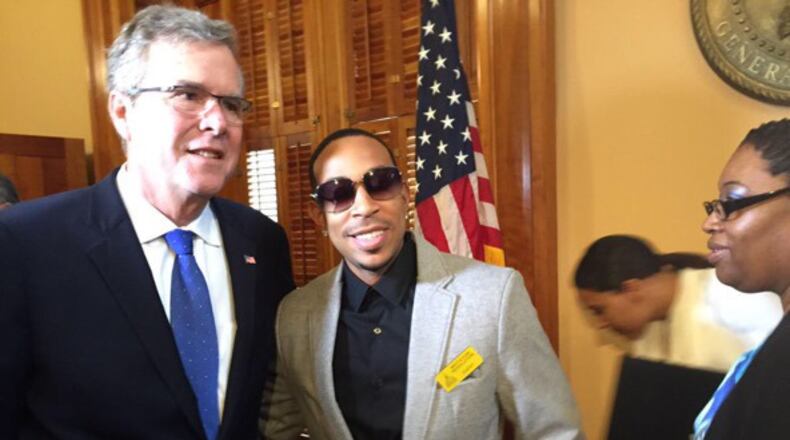Former Florida Gov. Jeb Bush made his case to state leaders at the Georgia statehouse Thursday and waded into several thorny policy debates facing legislators as he prepares a likely run for the White House.
Bush said he approved of a state push to legalize medical marijuana and gave a tacit endorsement to the Republicans behind a controversial “religious liberty” measure. He also urged lawmakers to embrace school choice legislation and talked with Gov. Nathan Deal about the Georgian’s plan to give the state broad new powers to intervene in struggling schools.
The likely candidate was in town as part of a Southern swing to meet with influential politicians and headline a fundraiser. He could face a particularly tough battle in Georgia, where his more moderate stances on immigration and the Common Core education standards could clash with a strong conservative strain of GOP politics.
“It’s going to be very difficult for him. The folks that support him are no different than the folks who support Mitt Romney,” said Maria Zack, , who is running a Super PAC in support of U.S. Sen. Ted Cruz of Texas. “If we keep doing the same thing over and over again in getting a moderate Republican, we cannot win.”
Bush dismissed such talk in remarks to a handful of reporters, saying his record on tax cuts and education made him the “most conservative governor in Florida’s history.”
“I’ve got a record I can run on that shows how conservative principles applied the right way give everybody a chance to be successful,” he said, adding: “I’ve got a record to run on. I’m not embarrassed about it, and I’m not going to change who I am. That’s a loser, too.”
He said a limited legalization of medical marijuana “is more than appropriate,” but he was wary of a broader effort to allow recreational use of the drug. Lawmakers in Georgia are debating competing medical marijuana measures this year, but a bid to legalize the drug has gone nowhere.
Some of his most nuanced remarks, though, came when asked about Georgia’s debate over a religious liberty proposal. Supporters say the legislation, Senate Bill 129, would provide an extra layer of protection to prevent the government from intruding on someone’s religious freedoms. Opponents see it as a “license to discriminate” that could allow business owners to deny service to gays or others.
“I don’t know about this law, but religious freedom is a serious issue and is increasingly so,” Bush said. “People that act on their conscience shouldn’t be discriminated against, for sure. There should be protections.”
A U.S. Supreme Court ruling on marriage equality, he said, would “automatically shift the focus to people of conscience” who may not want to provide services for a gay marriage.
“People have a right to do that, just as we need to be respectful for people who are in long-term committed relationships,” Bush said. “Sorting that out is important.”
About the Author
Keep Reading
The Latest
Featured





